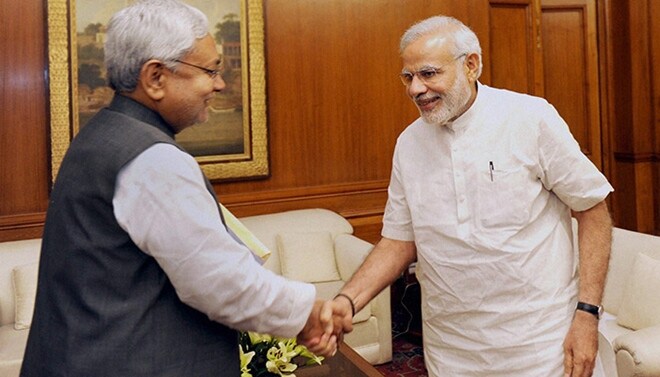Lok Sabha Election 2019: A peculiar incident during Prime Minister Narendra Modi’s election rally in Bihar’s Darbhanga district on April 25 has caught the eye of political watchers. Modi ended his speech, heavy on nationalism and the government’s actions against Pakistan-sponsored terror, also touched upon an issue that came into focus just days ahead of the Prime Minister’s visit.
Lok Sabha Election 2019: Full Coverage
Chanting Vande Mataram has been a bone of contention between two groups of thought ever since the Modi government came to power. While the BJP and its leaders believe that nobody should have a problem in saying Vande Mataram, the other side believes otherwise. Rashtriya Janata Dal leader and Grand Alliance candidate from Bihar, Abdul Bari Siddiqui, had said in a television interview that while he had no issues with saying Bharat Mata Ki Jai, chanting Vande Mataram was against his beliefs.
Addressing the rally, the Prime Minister picked on Siddiqui’s remark and said at the rally that those who have problems with chanting Vande Mataram must be defeated and their deposits forfeited. Ending the rally, Modi asked the crowds to hold up their fists and join him in chanting Vande Mataram. All on stage followed suit, except Bihar Chief Minister Nitish Kumar.
Will Sanghis & Bhakts call @NitishKumar Anti National & say Bharat mein Rahnaa hai to …… bolna https://t.co/IyOFvzK96L
— Asaduddin Owaisi (@asadowaisi) May 1, 2019
As crowds and leaders including LJP’s Ram Vilas Paswan, stood up and joined Modi in Vande Mataram chants, visuals of a silent Nitish Kumar who remained seated till Modi left the podium were difficult to miss even for the ordinary eye.
What piques interest in Nitish’s odd behaviour is the history that he shares with Modi much before he became Prime Minister. Having dislodged Lalu Yadav from power in Bihar and his carefully cultivated image of ‘Sushasan Babu’, Nitish had been positioned as a face who could one day become prime minister. Rapid infrastructural development coupled with a drop in crime only strengthened his image.
Crucially, Nitish Kumar remained a staunch opposer to Modi who was seen as a staunch Hindutva proponent for long and went on to cut ties with the BJP after Modi was chosen as the saffron party’s PM face. However, a series of developments later, Nitish returned to the NDA fold, breaking ties with RJD’s Lalu Yadav and dislodging the party from power once again to form a government with the BJP in Bihar. During the 2014 general elections that Nitish’s JD(U) contested alone and ended up winning just two of the 40 Lok Sabha seats.
Amid the twists and turns that unfolded in the last five years, rarely had Nitish put across his differences with the BJP and Modi in the manner that he put on public display last week. Call it subtle political messaging, a sign of things to come or plain lack of enthusiasm, Nitish Kumar’s silence in an atmosphere of enthusiasm is striking to say the least.

